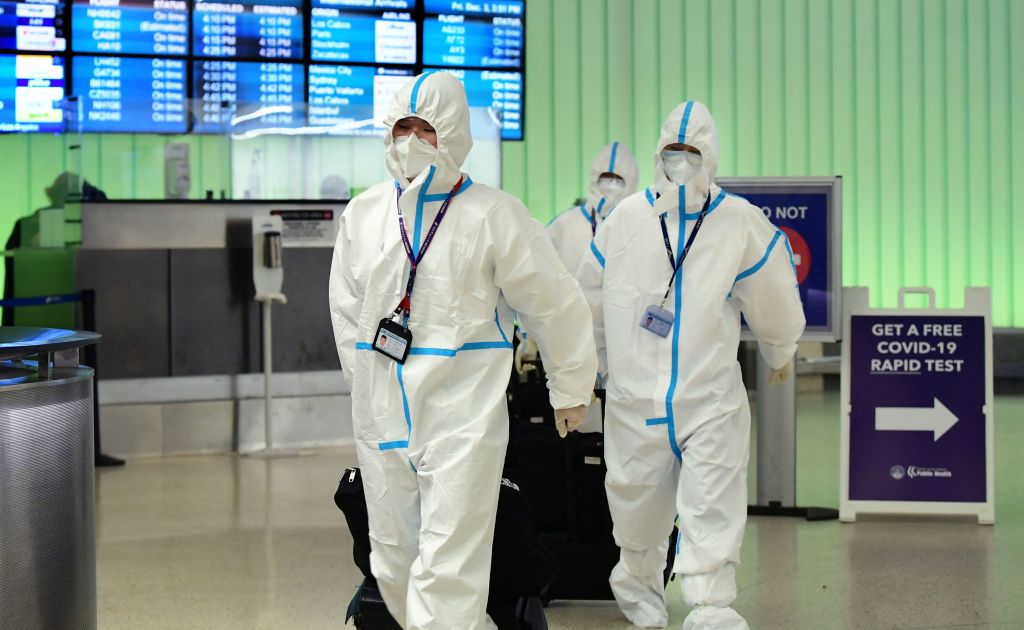Why the good news about the Omicron variant's reduced severity may be a mirage


A free daily email with the biggest news stories of the day – and the best features from TheWeek.com
You are now subscribed
Your newsletter sign-up was successful
There's a growing, caveat-filled consensus among public health experts that the new Omicron strain of the coronavirus is both more contagious and less severe than other COVID-19 strains. The evidence for greater transmissibility is more persuasive at this point than reduced severity, but "thus far, the signals are a bit encouraging regarding the severity," Dr. Anthony Fauci said on CNN this weekend.
Given the on-the-ground reports from the Omicron epicenter, Tshwane in South Africa, "I think the signs are actually extremely optimistic," Johns Hopkins epidemiologist Dr. David Dowdy tells The New York Times. Cases are soaring, most of them from the Omicron strain, but deaths are not rising.
Dr. Fareed Abdullah at the South African Medical Research Council told the Times on Monday that walking into the COVID-19 ward of the Tshwane District Hospital Complex is a very different experience than in previous waves, due to the lack of ventilator beeps and humming. "Out of 17 patients, four were on oxygen," he said. However, Abdullah wrote in a report over the weekend, "this may be due to the usual lag between cases and deaths."
The Week
Escape your echo chamber. Get the facts behind the news, plus analysis from multiple perspectives.

Sign up for The Week's Free Newsletters
From our morning news briefing to a weekly Good News Newsletter, get the best of The Week delivered directly to your inbox.
From our morning news briefing to a weekly Good News Newsletter, get the best of The Week delivered directly to your inbox.
"Severe COVID illness often takes a week or more to develop, and the world has been aware of Omicron for less than two weeks," David Leonhardt explains at the Times. Also, "the initial studies of Omicron patients have also come disproportionately from South Africa, where the population skews young and many people were previously infected with Delta. Both groups are unlikely to get very sick."
If the Omicron variant proves to be more contagious, "scientists are anxiously watching" whether it overthrows "the world-dominating" Delta strain in the U.S. and globally, The Associated Press reports. And if it turns out to be less severe, "it would be a great thing if, in fact, Omicron crowded out Delta," Dr. Warner Greene at San Francisco's Gladstone Institutes tells USA Today. "If Omicron was a less pathogenic virus, that would be very good news for the human race."
Maybe, Leonhardt writes. "One worrisome postscript is that even seemingly mild COVID infections can prove deadly for vulnerable people, like the elderly. The flu kills large numbers of elderly people for the same reason." And any reduction in severity could be canceled out by the spike in cases it produces, for a net increase in hospitalizations and deaths, World Health Organization COVID expert Dr. Maria van Kerkhove told CBS News on Sunday.
A free daily email with the biggest news stories of the day – and the best features from TheWeek.com
Peter has worked as a news and culture writer and editor at The Week since the site's launch in 2008. He covers politics, world affairs, religion and cultural currents. His journalism career began as a copy editor at a financial newswire and has included editorial positions at The New York Times Magazine, Facts on File, and Oregon State University.
-
 House votes to end Trump’s Canada tariffs
House votes to end Trump’s Canada tariffsSpeed Read Six Republicans joined with Democrats to repeal the president’s tariffs
-
 Bondi, Democrats clash over Epstein in hearing
Bondi, Democrats clash over Epstein in hearingSpeed Read Attorney General Pam Bondi ignored survivors of convicted sex offender Jeffrey Epstein and demanded that Democrats apologize to Trump
-
 Are Big Tech firms the new tobacco companies?
Are Big Tech firms the new tobacco companies?Today’s Big Question Trial will determine if Meta, YouTube designed addictive products
-
 A Nipah virus outbreak in India has brought back Covid-era surveillance
A Nipah virus outbreak in India has brought back Covid-era surveillanceUnder the radar The disease can spread through animals and humans
-
 Trump HHS slashes advised child vaccinations
Trump HHS slashes advised child vaccinationsSpeed Read In a widely condemned move, the CDC will now recommend that children get vaccinated against 11 communicable diseases, not 17
-
 Covid-19 mRNA vaccines could help fight cancer
Covid-19 mRNA vaccines could help fight cancerUnder the radar They boost the immune system
-
 FDA OKs generic abortion pill, riling the right
FDA OKs generic abortion pill, riling the rightSpeed Read The drug in question is a generic version of mifepristone, used to carry out two-thirds of US abortions
-
 The new Stratus Covid strain – and why it’s on the rise
The new Stratus Covid strain – and why it’s on the riseThe Explainer ‘No evidence’ new variant is more dangerous or that vaccines won’t work against it, say UK health experts
-
 RFK Jr. vaccine panel advises restricting MMRV shot
RFK Jr. vaccine panel advises restricting MMRV shotSpeed Read The committee voted to restrict access to a childhood vaccine against chickenpox
-
 Texas declares end to measles outbreak
Texas declares end to measles outbreakSpeed Read The vaccine-preventable disease is still spreading in neighboring states, Mexico and Canada
-
 RFK Jr. shuts down mRNA vaccine funding at agency
RFK Jr. shuts down mRNA vaccine funding at agencySpeed Read The decision canceled or modified 22 projects, primarily for work on vaccines and therapeutics for respiratory viruses
